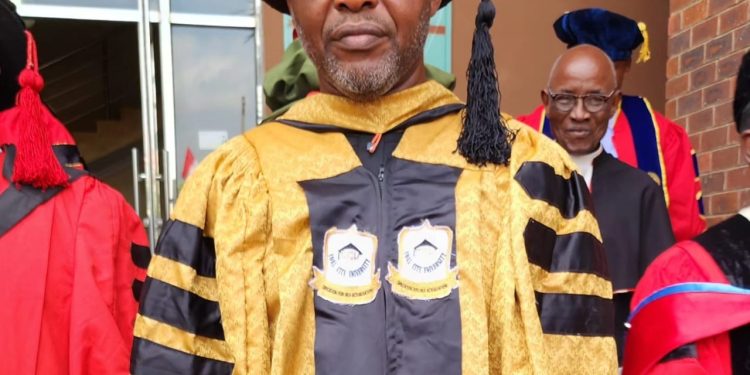Convocation Speech by Osita Chidoka OFR, NPoM, To the Graduating Classes of 2020, 2021, 2022, and 2023 of
Title: Unveiling The Shadows: Deciphering the Moral Ambiguities of Local Aphorisms
Distinguished faculty, proud parents, esteemed guests, and, most importantly, the extraordinary graduates of 2020 through 2023. Today, we gather to celebrate not just an academic milestone but a gateway to a world brimming with boundless possibilities and profound challenges.
I stand before you today because about 28 years ago, I sat where you are sitting today, hopeful about a future outside the university and yet worried about a Nigeria under a brutal military rule that paid little attention to human rights. At that time, we were a pariah nation after the annulment of the June 12, 1993 elections. The future of Nigeria as a nation looked bleak, and our path appeared irretrievably doomed. As students and activists, we moaned about our future, and many disconnected from the country.
I elected to make myself, in the words of a friend, “irresistible and indispensable.” Don’t forget these two words.
I looked at the cup as half full and offered myself wholeheartedly to the service of the nation during my National Service at Abuja. I won the NYSC FCT award and gained automatic employment as the prize that came with the award. My career gained traction and quick acceleration. Heading a paramilitary and significant government agency at a young age and delivering widely acknowledged successes that led to my promotion to senior cabinet Minister would be considered a successful career in any part of the world. But life is not only about a fairy tale; my failures also came in torrents.
I tried to be a Governor of my State without success. Thrice I played significant roles in electing a President, thrice I failed.
The failures came at a price. I wandered in the wilderness of opposition politics avoided by erstwhile friends and rarely received invitations from the government patronage-enabled Nigeria’s elite. The more challenging part was watching helplessly as our national gains in some areas were reversed and our national diversity mismanaged.
Politics is brutal and traumatic. The glamour of success belies the trauma of failure, the loneliness of loss, and the distressing task of facing family and true friends with news of yet another failure. I took all these in my stride and remained positive, hopeful, passionate, and optimistic.
These setbacks (as I see them) also enabled me to reach new audiences and make new friends and connections. It exposed me to many who appreciated my principled position that politics is not only about occupying public office but a call to service in spheres beyond official positions. My consistent avowal of transparency, adoption of technology, competitive and open recruitment in the public sector, and building an inclusive society with shared prosperity have attracted and continue attracting audiences who see the need for consistent collective action in reimagining our country.
Notable among that audience is your now alma mater, Coal City University. My invitation to deliver the first convocation lecture of this nascent and fast-growing institution is a testament to the power of ideas, staying true to yourself, and seeking to make yourself irresistible and indispensable. I stand on this podium with humility, conscious that your university chose me to throw light on your path, energize you to storm the heavens, and encourage you to reject norms and traditions that impede your ascent as persons trained in knowledge and character.
Graduation is more than a ceremony; it’s a passage into the hopeful enthusiasm of youth, armed with knowledge, ready to confront a rapidly transforming world. In an era of ground-breaking technological advancements, artificial intelligence, and machine learning, your generation stands at the forefront of a new epoch.
In philosophy, we are redefining ethics in the digital age. In engineering, innovations like sustainable energy solutions and smart cities are emerging. Health sciences are revolutionizing patient care through personalized medicine and advanced biotechnology.
As a Nigerian, you have advantages unique to us as a people despite our national pastime of lamenting our woes. As you begin your journey to confront the world outside of Coal City University, I will share some of the advantages Nigeria has bestowed on you. Nigeria instils boldness in you; we are a country of free and fearless people. We confront the world without any sense of inferiority. As a Nigerian, you can live with diversity. We thrive in other countries because our country is a crucible of diversity. We confidently confront diversity challenges because we live it daily, whether ethnic or religious. Our country has taught us how to assert ourselves and yet make the necessary compromises, enabling a shared sense of community. Our worst disagreements only magnify the bond that ties us.
Do not leave these walls as a complainant, lamenting only about what is wrong with the world. Think, instead, about how to make the world better and act accordingly.
I will not let you leave this venue with a one-sided view of Nigeria that awaits you. Nigeria faces profound structural economic challenges: our national debt is at an all-time high, unemployment figures are alarming, and our population, projected to reach staggering numbers by 2050, adds complexity to these challenges.
As of the second quarter of 2023, Nigeria’s total public debt has soared to N87.38 trillion.
The unemployment rate in Nigeria is projected to rise significantly. The Nigerian Economic Summit Group (NESG) projected an unemployment rate of 37 percent in 2023.
Nigeria’s population is expected to grow considerably in the coming decades. By 2050, the population is forecasted to surpass 377 million people, positioning Nigeria as the planet’s third most populous nation, just ahead of the U.S. and behind only India and China.
These figures depict a challenging economic landscape with substantial national debt, a high unemployment rate, and a rapidly growing population. The projection for 2050 indicates a significant demographic shift, underscoring the importance of preparing for a future where effective management of resources and job creation will be crucial.
Amidst the whirlwind of these realities, the world is witnessing a story of global progress driven by innovation, invention, and collaboration. Renewable energy technologies are tackling climate change, digital platforms are democratizing education, and global health initiatives are combating diseases. This progress narrative is a testament to human resilience and ingenuity.
According to HumanProgress.org, a project of the Cato Institute with support from other funders, the story of humanity is a story of progress despite multiple challenges.
• In 1950, the average life expectancy at birth was only 48.5 years. In 2019, it was 72.8 years. That’s an increase of 50 percent.
• Out of every 1,000 live births in 1950, 20.6 children died before their fifth birthday. That number was only 2.7 in 2019. That’s a reduction of 87 percent.
• Between 1950 and 2018, the average income per person rose from $3,296 to $15,138. That’s an inflation-adjusted increase of 359 percent.
• Between 1961 and 2013, the average food supply per person per day rose from 2,116 calories to 2,928 calories. That’s an increase of 31.7 percent.
• In 1950, the length of schooling that a person could typically expect to receive was 2.59 years. In 2017, it was eight years. That’s a 209 percent increase.
As you leave the walls of Coal City University, you must embrace optimism. You must walk victoriously with hope. Hope is not naive optimism. To be hopeful is to live.
In the course of my social media and in-person interactions, I have witnessed an increased level of understandable cynicism about Nigeria and disregard for issues of character and morality.
The diverse tapestry of Nigeria’s cultural heritage is enriched with an abundance of local aphorisms, traditionally revered as vessels of wisdom and ethical instruction. These aphorisms, historically, have played a pivotal role in nurturing moral values and guiding social conduct among the populace. However, in the contemporary societal environment, certain aphorisms have been perceived to harbour a moral ambiguity, which, when misconstrued or misapplied, may justify or even glorify behaviours that erode the moral fabric of society.
My goal today is to unveil the shadows cast by such aphorisms, attempting to decipher the moral ambiguity within them that may be facilitating a justification for the erosion of moral values among the youth. Using selected local aphorisms, this discourse seeks to unravel the complex interplay between traditional wisdom, contemporary interpretation, and the moral disposition of young Nigerians.
In unmasking the shadows and deciphering the moral undertones of these aphorisms, I aspire to ignite a robust conversation aimed at reconciling the rich cultural heritage encapsulated in local aphorisms with the moral dilemma of modern-day Nigeria. The goal is to foster a deeper understanding and constructive engagement with the traditional wisdom embedded in these sayings, thereby contributing to a collective endeavour toward nurturing a generation of young individuals fortified with moral integrity and ethical discernment.
Through this exploration, we envisage a pathway towards a moral renaissance that honours the wisdom of the past while embracing the ethical imperatives of the present, thus laying a solid foundation for a morally resilient Nigerian society.
As society evolves, so does the interpretation of traditional wisdom. Modern influences, globalization, and exposure to diverse cultures and ideologies can significantly impact how young Nigerians perceive and interpret traditional aphorisms and practices. Contemporary interpretation can uphold, modify, or challenge traditional wisdom, thus influencing how young Nigerians apply it daily.
As young Nigerians, your moral disposition is a product of both traditional wisdom and contemporary interpretation. The balance or tension between these two forces can significantly impact your ethical outlook, behaviour, and choices.
You are likely to face ethical dilemmas when there’s a dissonance between traditional moral precepts and contemporary moral or social norms. This dissonance can lead to moral ambiguity or conflict, affecting your moral disposition.
The interplay among traditional wisdom, contemporary interpretation, and the moral disposition of members of your generation is a continuous dialogue. It reflects the dynamic negotiation between the past and the present, tradition and modernity.
This interplay can foster a learning environment where young Nigerians can critically engage with traditional wisdom, adapt it to modern contexts, and develop a nuanced moral compass that respects cultural heritage while embracing contemporary ethical standards.
Now, let’s turn our attention to the heart of my message, grounded in the wisdom of our local aphorisms yet echoing universal truths.
- Embrace Curiosity and Inquiry:
The first aphorism is “Rapu ife ede na motor banye motor,” it is an urban aphorism loosely translated as “Ignore the inscription on the car while boarding the vehicle.” This saying, at its core, discourages curiosity and inquiry. It promotes a culture of accepting things at face value without questioning or seeking a more profound understanding.
This mindset is opposed by a Chinese proverb: “He who asks a question is a fool for five minutes; he who does not ask a question remains a fool forever.”
In the Igbo worldview, “onye ajuju anaghi efu uzo.” This Igbo saying can be translated as “a curious person that asks questions can never miss his way.”
As young graduates, you must embrace curiosity and inquiry. The world needs your questions, your doubts, and your thirst for understanding.
I urge you to embrace curiosity, for it is the bedrock of innovation. Embrace inquiry, for it is the pathway to wisdom. In a world teeming with information, your ability to question, reason critically, and seek truth will set you apart.
- Principle-Driven Approach:
The second aphorism, “Onye kpu igu ka ewu na eso,” meaning “The goat follows whoever holds the palm frond,” highlights the pitfalls of blind and unprincipled followership. It reflects a mindset where principles are traded for immediate gains.
In reality, the true sense of that proverb is “o so ewu na eso onye kpu igu,” meaning that only a goat would mindlessly follow a person for food. It is assumed that a human being with intellect and conscience would not behave as unprincipled as to live only for stomach infrastructure. The use of the distorted proverb has been weaponized in the rationalization of unprincipled behaviour and refusal to be guided by moral ethos.
I urge you to remember the words of Mahatma Gandhi, “Be the change that you wish to see in the world.” As you face the world, let your actions be guided by principles, not swayed by fleeting gains. Stand firm in your beliefs and values and let them navigate you through life’s tumultuous seas.
As you step into the world, be guided by solid principles. Let not the allure of quick success sway you from your path. Remember, true success is not measured by what you acquire but by the integrity and values you uphold. A principle-driven approach will not only bring you lasting success but will also earn you respect and trust.
- Respect for Rules and Consideration for Others:
Finally, “Azu eli ro azu ibeya o ma ebu,” translating to “A fish can only grow by feeding on other fishes,” echoes a Darwinian survival-of-the-fittest philosophy. It suggests success at the expense of others. This false capitalist ethos denies our shared humanity’s capability for shared prosperity. It is a doctrine for selfish and self-centered primitive acquisition without consideration for the other person. Contemporary knowledge has shown the extent of the damage humans can do with the mindless extraction of resources and its impact on the environment.
Contrast this with the African proverb, “If you want to go fast, go alone. If you want to go far, go together.” Success should not come at the cost of others. Strive for achievements that uplift not just yourself but also your community.
In your pursuit of success, remember the importance of morality, the value of community, and the significance of playing by the rules. Strive for success but do so with consideration for others and respect for the societal norms that bind us together.
Indeed, many sayings and aphorisms create moral ambivalence and confuse young minds.
Today, my assignment to you graduates is to identify such aphorisms and unveil the shadows around them. However, with the education you have acquired, it is your responsibility as a human being to become discerning and refuse to follow the herd.
Your individuality is a divine gift. Guard it jealously.
In closing, as you step into this new chapter of your life, remember that the most remarkable achievements are those that benefit humanity. The knowledge and skills you have gained here are not just for your success but for the betterment of society. Embrace your role as agents of change, as architects of a future where progress, ethics, and compassion walk hand in hand.
I implore you to imbibe the triple heritage of Uche (Knowledge, Wisdom), Uchu (hard work, persistence, Skill), and Egwu Chukwu (respect for God, morality, and consideration for others)
Congratulations, graduates. You are the torchbearers of a new era. May your journey be filled with curiosity, guided by principles, and enriched by collaboration. Make yourself irresistible and indispensable.
Thank you.
Osita Chidoka
2 December 2023






